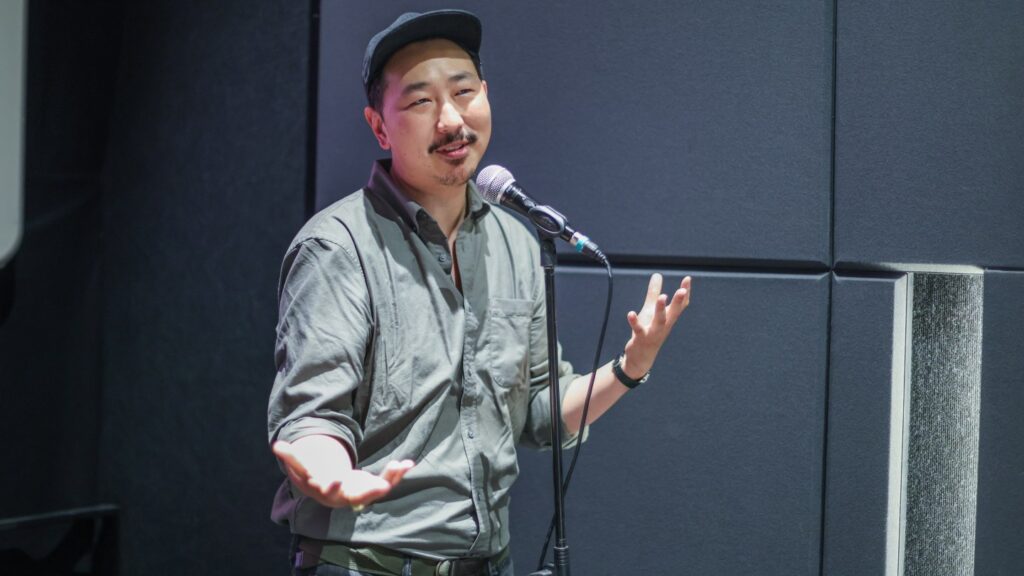Andrew Ahn is nearing the end of the promotional road for his latest film The Wedding Banquet.
The hectic months-long swirl started with the world premiere in January at the Sundance Film Festival, and continued with showings at London’s BFI Flare LGBTQIA+ Film Festival, the Sonoma International Film Festival, a couple of Midwest fests (Minneapolis St. Paul and Wisconsin), the Miami Film Festival and a series of special spotlights and panel discussions at the Tribeca Festival in New York and Film Independent in Los Angeles. There was even a drag brunch and Gold House special event along the way.
But his newest appearance on behalf of the Bleecker Street title may have landed him the most frequent flier miles yet. Ahn touched down in the capital city of Valletta, Malta this week to present the film during the third annual Mediterrane Film Festival. The Wedding Banquet, Ahn’s reimagining of Ang Lee’s romantic comedy from 1993, stars Bowen Yang, Kelly Marie Tran, Lily Gladstone, Han Gi-Chan, Joan Chen and Youn Yuh-Jung. The story follows two gay couples — Angela and Lee (Tran and Gladstone) and Chris and Min (Yang and Gi-Chan) — whose relationships get dramatically and hilariously mixed up when Min proposes to Angela to obtain a green card in exchange for paying for IVF treatment. His grandmother, played by Youn, hears about the impending wedding and makes a surprise trip to Seattle, further complicating the situation.
Kelly Marie Tran, Lily Gladstone, Han Gi-Chan and Bowen Yang in The Wedding Banquet.
Luka Cyprian/Courtesy of Sundance Institute
“I’ve always been curious about coming to Malta,” Ahn said of accepting the fest’s invitation during the film’s post-screening Q&A moderated by The Hollywood Reporter inside Valletta’s Embassy Cinemas. “I have a mentee who is a Maltese American filmmaker, Alex Camilleri, and I have some friends who live in Italy and I’m going to visit them later.”
When I got the invite, I told my boyfriend that there’s a film festival in Malta that has invited me and he said, ‘Don’t go, it’s homophobic there.’ And I Googled it and it said it’s one of the most LGBTQ friendly countries in the [European Union]. Weeks later, my boyfriend, we were having dinner, and he said, ‘It’s actually the Maldives.’ I looked it up and it’s illegal to be gay there. He almost stopped me from coming. I’m glad I Googled it for myself.”
If anyone’s done any online research in recent months about Ahn’s journey in bringing The Wedding Banquet to the screen, they would’ve found out that Lee’s original film marked the first gay film Ahn ever saw back when he was 8 years old. He worked with indie guru James Schamus, the film’s original co-writer, in updating the screenplay for modern audiences while adding his own signature touches to make it more personal all with Lee’s blessing.
“[Ang] has seen the film and he’s been wonderfully supportive throughout the process,” Ahn explained. “I think he knew that he wanted to give me a certain amount of space, so he wasn’t giving us feedback on anything. He kind of gifted that authorship to me and to James so that we could make the version for 2025.”
Doing so delivered a lot of unexpected emotions for Ahn, who has said that the film’s themes of gay marriage and parenthood landed at a time when he’s been pondering both with his partner. “I was kind of a disaster on set,” Ahn said with a laugh. “I was crying all the time, but I kind of leaned into that. The film wears its heart on its sleeve, and I felt like I had to do that as a director or I wouldn’t have been able to make this.”
Asked what he wants to do next, Ahn said he’s still nailing it down.
“I am very committed to telling queer Asian stories and I keep trying to figure out ways to tell those stories with bigger platforms, and this film has shown me ways that we can do that,” he said, adding that he has hopes to move away from the comedy chops he’s shown in The Wedding Banquet and Fire Island and return to more traditional dramas like he delivered in Spa Night and Driveways.
“I’m trying to figure out a few different projects. I’m kind of dying to do a drama again, just because I think comedy is incredibly difficult. It’s so hard,” he said. “It’s incredibly precise but also kind of magical genre. Comedy is always trying to surprise an audience. You set up an expectation and then you subvert it to get a reaction to laugh. On Fire Island, there was a joke that never worked during test screenings. My editor made two syllables of a single word louder and suddenly people started laughing. I hated that because it means that humor, comedy and laughter are so fickle. That’s why I would love to do a drama again.”
